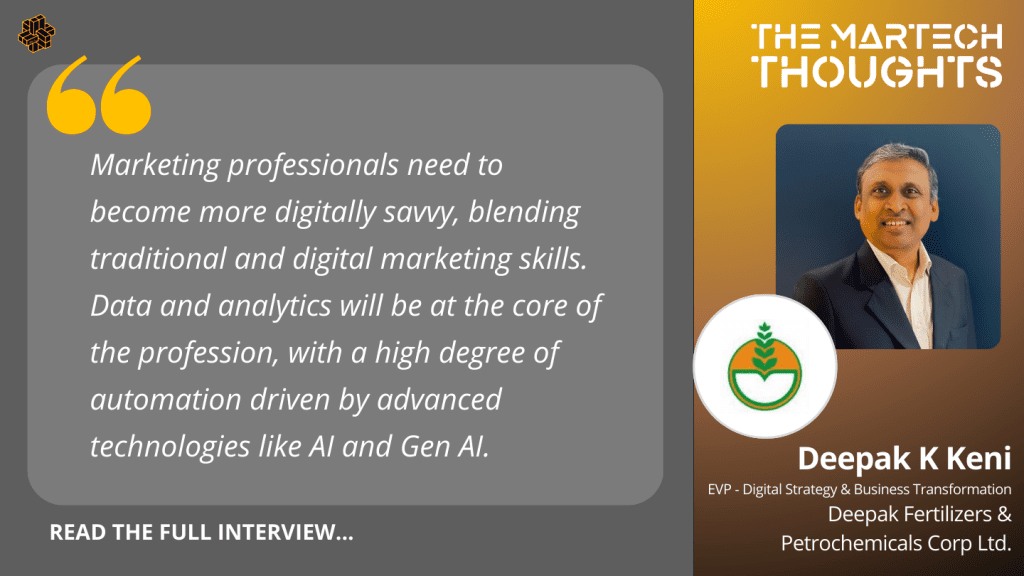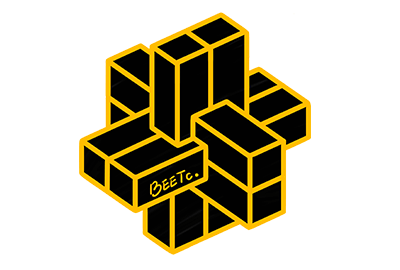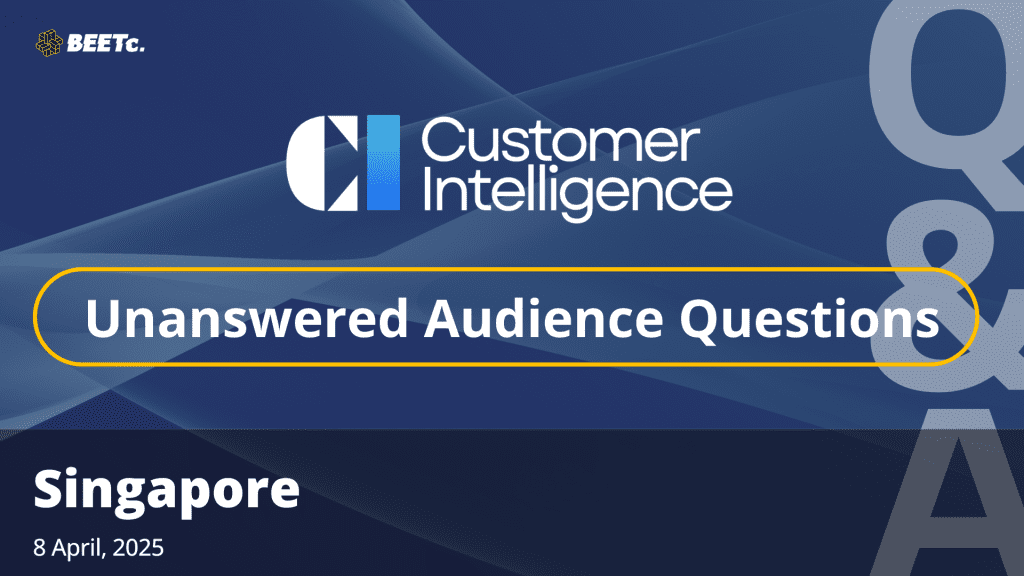
Welcome Deepak K Keni, EVP – Digital Strategy & Business Transformation at Deepak Fertilizers & Petrochemicals Corp Ltd, to the MarTech Thoughts series! Deepak shares his forward-thinking views on AI’s role in marketing, digital transformation, and the power of quantum marketing. From data-driven strategies to creating seamless customer experiences, his insights are invaluable for marketers navigating today’s dynamic landscape.
How do you describe your job to a 5-year-old?
I help make the company smarter by upgrading its tools and processes. Think of a toy soldier made of wood that can only move when you control it. My job is to turn that toy into a Transformer that can do amazing things on its own—fly, transform into a car, and even fix itself if it breaks. Similarly, I help the company work faster, smarter, and become more successful.
Currently, what are you primarily looking for in your digital marketing efforts?
We are undergoing a complete transformation to build a digital-first brand in the next five years. Our strategy focuses on getting closer to our end consumers by creating value-added products and services through digital channels. This includes personalised engagement, segmentation, and increasing customer loyalty and advocacy to attract new customers.
At your organisation, what marketing tasks are suitable for automation, and which tasks still need a human touch? Is there any part of the marketing process that includes AI?
Over the last few years, we have embarked on a complete digital transformation in marketing, starting with basic digitisation and progressing through digitalisation. We are now moving toward full digital transformation, including Gen AI and fully automated business processes. Most of our marketing tasks have been automated, but human intervention is still required, particularly in creative content, language translation, and CRM. Core marketing processes like social media management, content marketing, and campaign management are more automated than others. We enable AI-assisted marketing processes in contact centres, content creation, voice-to-text and vice versa, and an AI-enabled recommendation and nudge engine to enhance end-to-end customer journey management.
What are some of the significant changes to your customer outreach and retention strategies? And how has it impacted the growth plan for upcoming years?
In recent months, we’ve implemented focused customer segmentation strategies, identifying unique cohorts with shared characteristics to allow for targeted go-to-market strategy and value propositions. Unfortunately, a large portion of our client base (farmers) in emerging markets are not tech-savvy and use digital tools minimally for farming operations. Direct-to-consumer channels, including e-commerce, are not commercially viable for most product offerings, so much of the customer journey remains physical rather than digital. We are encouraging customers to adopt more digital touchpoints through hyper-personalised mobile apps, loyalty programs, and influencer advocacy programs to improve outreach and retention. We expect to double our speciality product sales in the next five years and engage deeply with 500,000 customers.
How do you see the skillsets needed for the marketing profession changing?
Marketing professionals need to become more digitally savvy, blending traditional and digital marketing skills. Data and analytics will be at the core of the profession, with a high degree of automation driven by advanced technologies like AI and Gen AI. Emerging concepts like quantum marketing will become mainstream within the next five years. There will be increasing pressure on marketers to demonstrate ROI at a faster pace. Brand building objectives will also accelerate, as markets, customer segments, channels, competition, and products continue to evolve rapidly.
How do you keep your team motivated to get the best out of them during challenging economic times with additional external pressure?
We focus on team-building exercises and cross-functional initiatives to raise awareness of the economic challenges. We also work closely with startups and institutions to introduce next-generation business models, which helps keep the team engaged and forward-thinking.
Please share with us one of the best campaigns you have seen recently or your all-time favourite campaign, and tell us why.
Nike’s “Just Do It” campaign is my all-time favourite. It exemplifies the importance of getting the job done, regardless of circumstances. It places the individual at the centre of the change or transformation, driving business goals forward. It’s a powerful message about perseverance and delivering results—no excuses, no justifications.
What will be the next evolution in marketing technology that we can expect in the coming years?
The next evolution will likely be quantum marketing, powered by quantum computing and edge devices in a hyper-connected world. This will lead to real-time hyper-personalisation and automation, with machine-to-machine interactions requiring minimal human intervention. Consumers will become the ultimate decision-makers, demanding everything as a service, anywhere, at any time, with the flexibility to change instantly.
What are the key challenges when implementing new technologies or platforms for the first time in your company, and do you have any suggestions for making the process smoother?
Key challenges include adoption, change management, demonstrating business impact, and sustainability. To smooth the process, it’s crucial to have a strong sponsor or executive champion. Engaging key stakeholders from the initial discovery phase through to implementation and benefit realisation is essential. A focused change management program with relevant training, assistance, and motivation, coupled with an emphasis on behavioural change, is also critical.
What is the most effective use of technology you’ve seen in navigating today’s rapidly changing and diverse world?
The Internet of Things (IoT) has revolutionised how devices communicate with each other, creating new business models and accelerating disruptive environments. IoT is driving significant changes in society, transforming how humans live and interact.
What is the scope of using AI and machine learning in Marketing Mix Modelling?
AI and machine learning have significant potential in Marketing Mix Models. We have conducted many pilots in this area and are working to improve these models to better measure the effectiveness and efficiency of marketing campaigns. However, the journey is not easy and will take a few years from the initial model to develop a highly accurate one.
With the advancement of AR & VR, how do you see these being utilised in Digital Storytelling?
The next generation of consumers is very digitally savvy and expects digital products and services at their fingertips. AR and VR will be key enablers for storytelling and communication with these consumers in a virtual world. The Metaverse will create a whole parallel digital universe where AR and VR will facilitate interactions and experiences.
What is your strategy to link up traditional and modern trade ecosystems?
Both traditional and modern trade ecosystems will continue to coexist, with situational shifts between the two. The strategy is to create a cohesive ecosystem where customer journeys can start and end anywhere, with strong integration between traditional and modern trade systems. For example, traditional systems should be able to handle most integrations with modern trade systems and vice versa.
How much of your marketing is data-driven?
We are a highly data-driven marketing organisation. However, the journey is ongoing as more customer touchpoints are being mapped across customer journeys, leading to the generation of more data—both external and internal. We are on our way to becoming fully automated in data-driven marketing, at least for core processes and building a data-driven culture that effectively leverages new data sources with increasing confidence in advanced technologies like AI and machine learning.
What challenges do you see in processing data coming from different sources? How to overcome?
The biggest challenge with data from multiple sources is integrating and contextualising it. Without this, the value of the data erodes significantly. We are finding ways to tag, create metadata, and establish keys and hooks across different data sources, contextualising them with respect to customer journeys to make the data more meaningful. Some modern CRM solutions, coupled with Gen AI technologies, allow partial automation of this integration, but the rest must be done manually based on use cases. The key is identifying and building unified data repositories tailored to use cases.
With more consumers being conscious of their data being shared, how do you overcome the growing concern?
This is a classic challenge, as customers are increasingly aware of data privacy and sharing. We must enhance transparency when collecting and managing data and find ways to restrict data access and usage both within and outside the organisation. Methods such as masking personally identifiable information can help prevent unauthorised sharing, reassuring customers that their data is safe. We must be very selective about what data to collect, store, share, and delete (after a certain time period).
Any fun facts about yourself that you want to share?
Globe trotter across 30 countries with one round-the-world journey within 3 days
Are there any questions you’d like to ask to other MarTech enthusiasts?
In MarTech, which capability do you think is more important—marketing or technology?
A big thank you to Deepak K Keni, EVP – Digital Strategy & Business Transformation at Deepak Fertilizers & Petrochemicals Corp Ltd, as he shares his insights on AI’s role in marketing, digital transformation, and the power of quantum marketing. If you want to connect with Deepak, feel free to reach out via LinkedIn!
See more MarTech Thoughts interview pieces here!
Last updated: October 2024













